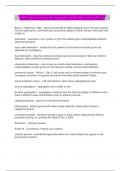CLEP American Government | Questions & Answers (100 %Score) Latest Updated
2024/2025 Comprehensive Questions A+ Graded Answers | With Expert Solutions
Barron v Baltimore, 1833 - determind that Bill of Rights applied to the Fed govt and did
not bind state govts, confirmed dual citizenship (citizens of both fed govt and state they
reside in)
federalism - practiced in US, system of govt that divides govt responsibilities between
state and fed govts
layer-cake federalism - implies that the powers of the central and state govts are
separate but overlapping
dual federalism - idea that national and state govts are sovereign in their own distinct
spheres, clear distinctions between govts
cooperative federalism - also known as marble-cake federalism, emphasizes
responsibilities of state govts and the fed govt overlap, shared responsibilities
commerce clause - Article 1, Sec 2, fed courts use to enhance power of national govt,
Congress has power to regulate commerce that takes place between States
equal protection clause - 14th Amendment, strike down segregationist laws
de jure segregation - segregation as a matter of law
de facto segregation - segregation resulting from the fact that people of different colors
lived in different areas and therefore went to different schools
categorical grants - grants to fund specific projects
block grants - federal grants with fewer strings attached, states prefer these to
categorical grants
unfunded mandate - fed govt instructs a state to meet certain requirements without
providing funding, for example the Real ID Act of 2005
devolution - shifting of power
Article III - Constitution, federal court system
solicitor general - presidential appointee within the Justice Dept who argues on the
government's behalf
,writ of certiorari - first step in a case being heard by the Supreme Court, calls for lower
court to send records related to the case
remanded - the case is sent back to a lower court for retrial
opinion per curiam - an unsigned opinion
concurring opinion - justices agree with their decision but for reasons different from
those stated in the majority opinion
United States Report - Supreme Court decisions, public record
US district courts - under the Supreme Court, have general jurisdiction (over varied
topics), trial courts related to federal govt or law, each state has at least 1
US court of appeals - appellate court, appeal made after US district court decision
amicus curiae briefs - submitted by interest groups, "friend of the court" briefs persuade
the court that it should decide a case a certain way
FISA court - a court that grants the federal govt the power to place surveillance on
suspected spies, initiated by FISA Act (Foreign Intelligence Surveillance Act of 1978)
senatorial courtesy - a senator's veto of a judicial nomination
chief justice - Supreme Court's main judicial officer, manages the Court itself, presides
over the federal court system and the Judicial Conference of the US, setting the court
system's priorities
judicial review - the power to determine what is and what isn't constitutional, established
in Marbury v Madison, 1803
judicial activism - judges acting as legislators and making policy as they see fit
judicial restraint - federal judges decide narrow constitutional matters and don't usurp
the power of the other branches of govt
broad construction approach - interpret the Constitution in light of its underpinning
principles and in light of evolving moral and cultural standards, , "living Constitution",
liberal
strict construction approach - wish to be faithful to the letter of the words of the
Constitution
eminent domain - govt right to acquire private property in the public interest
, civil liberties - freedoms granted to us by the Constitution
civil rights - privileges and powers granted to the people as equals under the law
establishment clause - in Bill of Rights, 1st Amendment, Congress may not establish
(found) an official religion
free-exercise clause - in Bill of Rights, 1st Amendment, individuals have freedom to
engage in religious practices
Lemon v Kurtzman 1971 - provided courts/interest groups with a "Lemon Test" to
determine whether their activity was constitutional, remained in place until 1997
Agostini v Felton - court decided that 1st Amendment of Constitution requires only govt
neutrality toward religion, allowed public school teachers to teach remedial, nonreligious
classes at religious schools at taxpayer expense
Zelman v Simmons- Harris, 2002 - court allowed parents to use publicly funded school
vouchers to pay tuition at religious schools
Lynch v Donnelly, 1984 - Court held that a Christmas manger display, along with a
depiction of Santa, on public property was constitutional
Engel v Vitale - Court prohibited Bible reading and prayer in public schools
Sherbert v Verner, 1963 - Court ruled that a state could not decline to give
unemployment benefits on account of a Seventh-Day Adventist's refusal to work on a
Saturday
Schenck v US, 1919 - "Clear and present danger" test, free speech
exclusionary rule - Mapp v Ohio, evidence obtained illegally cannot be used against a
defendant (4th Amendment)
good faith exception principle - if a warrant to gather evidence was based on faulty
evidence but given in good faith, the evidence could still be used in trial
privatization - handing over to private enterprise work that was formerly done by
government employees
deregulation - if government regulates less and allows private enterprise greater
freedom, government growth will slow, because there is less regulation to enforce
devolution - turning over of functions carried out by federal government to the states




